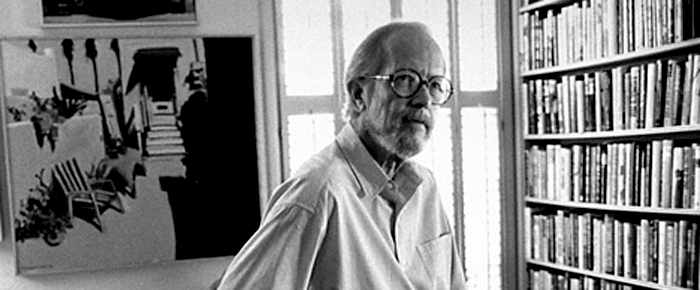
By Heidi Simmons
Open a book by author Elmore Leonard and you know exactly what you’ll get: Snarky, fast-talking characters who are out of their league, usually in deep and being chased down by an equally flawed and troubled lawman (or woman). Always with a clever title and colorful cover, Leonard’s stories have a real edge and disturbingly humorous dialogue.
Leonard died last week at the age of 87. He leaves behind 45 novels and eight million books in print with his long-time publisher William Morrow. Besides crime novels, he wrote westerns, short stories and screenplays.
After serving in the Naval Reserves in the South Pacific during World War II, Leonard studied English and philosophy at the University of Detroit. He married his college sweetheart and started a family, ultimately having five children. To support his brood, he worked as an advertising copywriter. Leonard would wake up early and spend two hours everyday working on his stories. His rule was to get something on paper — before he started the coffee.
Leonard started his career writing westerns, publishing more than 30 short stories like The Captives, which was made into the film “The Tall T” (1957) and Three-Ten to Yuma, also made into a film — twice (1957, 2007).
In 1951, his first published short story Trail of the Apache appeared in the men’s magazine Argosy. His first novel, The Bounty Hunters was published in 1953. After 20th Century Fox bought the rights to Hombre in 1966 (Paul Newman stared in the film made in 1967), Leonard’s career took off. With westerns loosing popularity, and with more clout and money, Leonard made the switch to crime fiction full time.
From 1969 to 1979 Leonard wrote 11 crime novels and three screenplays. (He adapted “The Moonshine War”, “Joe Kidd” and “Mr. Majestyk” were original screenplays).
Drawing the biggest talent the industry has to offer, “Hollywood” loved Elmore Leonard — and still does. More than half his works have been adapted to film and television. Get Shorty was directed by Barry Sonnenfeld, starred John Travolta, Danny DeVito and Rene Russo. Rum Punch became Quentin Taratino’s “Jackie Brown” with Pam Grier and Samuel L. Jackson. Out of Sight starred George Clooney and Jennifer Lopez and was directed by Steven Soderbergh. FX series “Justified” is based on several of Leonard’s popular characters and short stories. Debuting in September at the Toronto International Film Festival is “Life of Crime” starring Jennifer Aniston and John Hawks, based on Leonard’s 1978 novel The Switch.
If writing fiction wasn’t enough, he put together a book about writing called, Elmore Leonards’s 10 Rules of Writing published in 2007. In this minimal but substantive book of only 95 pages, Leonard shares some of the rules he’d learned about his craft. They are so simple I thought I should share them:
Rule number One: Never open a book with the weather. Two: Avoid prologues. Three: Never use a verb other than “said” to carry dialogue. Four: Never use an adverb to modify the verb “said”…he admonished gravely. Five: Keep your exclamations points under control. You are allowed no more than two or three per 100,000 words of prose. Six: Never use the words “suddenly” or “all hell broke loose.” Seven: Use regional dialect, patios, sparingly. Eight: Avoid detail descriptions of characters. Nine: Don’t go into great detail describing places and things. Ten: Try to leave out the part that readers tend to skip.
His ten rules include examples from his work and there are cool illustrations done in pen and ink. These are not trade secrets, but they are important and it gives us insight into his trimmed down and unadorned work.
Another practical tip he shared was, “If it sounds like writing, rewrite.” As an author, Leonard liked to be invisible and he wanted his characters to shine whether they were good or bad. He had a gift to tune into his characters and let them loose — maybe even guiding the direction of the story.
Leonard’s novel LaBrava won Leonard the prestigious Edgar Allen Poe Award for Best Novel from the Mystery Writers of America in 1984. Leonard took his craft seriously. He knew that with strong compelling characters and superbly realistic dialogue the writing didn’t need embellishment.
When I think of purely entertaining reads, I think of Elmore Leonard. He had an innate ability to take his readers into a world and introduce us to people we never thought we’d want to spend time with — and totally dig it. Thank you Dutch. Rest in peace.












































